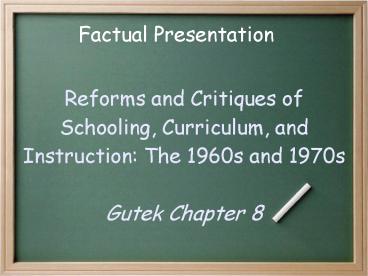Factual Presentation - PowerPoint PPT Presentation
1 / 31
Title:
Factual Presentation
Description:
Factual Presentation. Reforms and Critiques of Schooling, Curriculum, and ... 'grim', 'joyless,' and 'oppressive' and 'intellectually sterile' Main Trends ... – PowerPoint PPT presentation
Number of Views:178
Avg rating:3.0/5.0
Title: Factual Presentation
1
Factual Presentation
- Reforms and Critiques of Schooling, Curriculum,
and Instruction The 1960s and 1970s - Gutek Chapter 8
2
Context
3
(No Transcript)
4
(No Transcript)
5
Main Trends
- Attempts at raising standards of basic
education - Humanistic / Romantic Critics
- Open Education Movement
- De-schooling society
- Neo-conservative Movement
6
Attempts at raising standards of basic education
- Curricular Innovations
- Organization and Staffing Innovations
7
Raising standards through Curricular Innovations
MACOS (Man A Course of Study) - discovery
method - comparison with animals - controversial
topics
8
(No Transcript)
9
Raising standards through Curricular Innovations
- New Math
- - method discovery approach
- - content sets, structure, logic, and axiomatic
proofs - - greater academic preparedness in teacher
colleges
10
(No Transcript)
11
Think Like a Mathematician?
12
(No Transcript)
13
Raising standards through Curricular Innovations
- Morris Kline's Why Johnny Can't Add The Failure
of the New Math - gtgt not enough research with divergent groups
- gtgt precise language results in expanded
terminology - gtgt abstraction feasible for only top 1/3
- gtgt neglectful of fundamental computational skills
14
Organization and Staffing Innovations
- Commission on the Experimental Study of the
Utilization of the Staff in the Secondary School,
of the National Association of Secondary School
Principals - gtgt charged to solve the secondary school teacher
shortage - gtgt began in 1955, directed by J. Lloyd Trump
- gtgt part of the educational establishment
- gtgt focused on schools, not larger social issues
- gtgt reform by incremental changes
15
Organization and Staffing Innovations
- gtgt subprofessionals
- gtgt educational technologies (CC-TV,FM)
- gtgt independent leaning centers in libraries,
laboratories
16
(No Transcript)
17
Organization and Staffing Innovations
- In 1961, over 1000 school implementing these
ideas
- team teaching
- independent study
- large- and small-group classes
- flexible scheduling
- use of teacher assistants and subprofessionals
- new instructional technologies
- more open architecture
18
Main Trends
- Humanistic/Romantic Critics
19
John Holt
- gtgt outside the establishment
- gtgt ex-teacher
- gtgturged freedom and liberation instead of
bureaucracy - gtgt belief in children
- gtgt teacher rules and interventions restrict
eagerness to experiment - gtgt children should be able to construct their own
knowledge base
20
Main Trends
- Open Education Movement
21
(No Transcript)
22
Open Education Movement
- gtgt British Primary School
- gtgt 1968-1973 National Association of independent
Schools sponsor workshops - gtgt reform from elementary schools instead of
universities
23
(No Transcript)
24
(No Transcript)
25
Open Education Movement
- Charles Silberman
- gtgt lecturer in economics at Columbia University
- gtgt director of the Carnegie Commission's Study of
the Education of Educators - gtgt analysis of schooling in larger social
contexts - gtgt found America's overly-formal schools to be
- grim, joyless, and oppressive and
- intellectually sterile
26
Main Trends
- De-schooling Society
27
De-schooling Society
- Ivan Illich
- Founder of the Center for Intercultural
Documentation in Mexico
28
(No Transcript)
29
De-schooling Society
Deschooling Society published in 1971 attacked
gtgt unending consumption gtgt transfer of
Western institutions Closing schools is part of
a the de-institutionalizing of western society
30
Main Trends
- Neo-Conservative
- Trends
31
Neo-conservative Trend
- gtgt opposed unstructured and permissive classrooms
- gtgt stressed primacy of skills and subject matter
sequence - gtgt strong leadership
- gtgt clear goals































